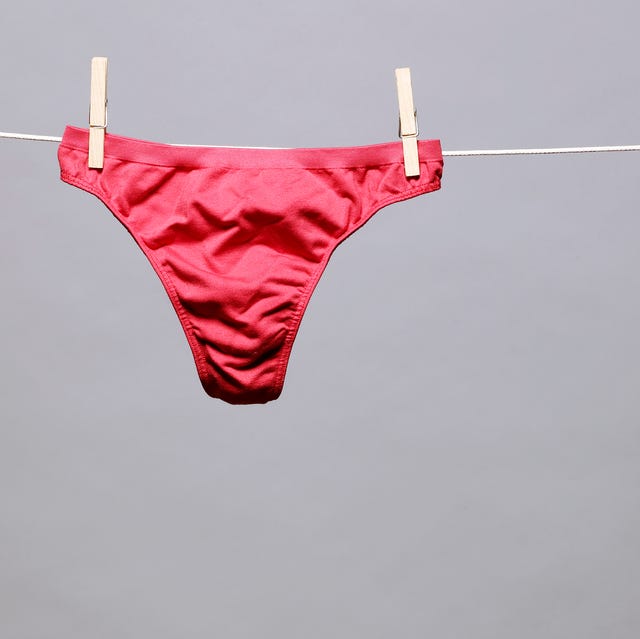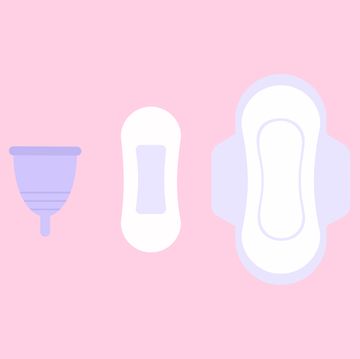Do you remember the first time you realized that your vagina region gets sweaty? Maybe you worked out extra hard or spent a long day walking around in the heat. Then, when you got to the bathroom, you noticed some seriously, er, sweaty underwear.
I mean, everyone knows that people sweat from their armpits, forehead, and sometimes their backs or hands. But being sweaty adjacent to the vagina? That's less than ideal, let’s be honest. Here’s the scoop on why your vagina is so sweaty, whether that's there is typical or something to be concerned about, and what you can do to stop sweating between your legs.
First of all, getting sweaty in the vagina area is totally normal.
It happens to everyone. That’s because we sweat wherever we have sweat glands, says Chris Adigun, MD, a board-certified dermatologist based in North Carolina. And there are sweat glands all over your vulva, which is the external area surrounding the vagina.
Remember: Your vagina is internal—the surrounding area is actually called the vulva. And there are no sweat glands inside your vagina, Dr. Adigun points out. So, it’s not really true to say that your vagina is sweating, just to be extra clear.
However, there are sweat glands on the parts *around* your vagina. Specifically, sweat glands exist where the hair on your vulva exists—that’s the labia majora (the big, outer “lips”), the mons pubis (the hump above your vagina), and the groin (where your legs meet your pelvis). “Your groin is not really all that different from your underarm,” Dr. Adigun says.
Just like your armpit, your groin is a junction between a limb and your trunk (except instead of your arms, it’s your legs). That’s why it makes more sense to call perspiration down there crotch sweat, as opposed to vagina sweat.
It's also worth noting that the sweat glands that exist on your vulva are different from most of your sweat glands. The majority of your body is covered in eccrine glands, while the areas of your body that are super hairy, like your scalp, armpits and crotch, have apocrine glands, according to Mayo Clinic. Apocrine glands produce a thicker sweat than eccrine glands, and it can have an odor when it mixes with bacteria. That's why a sweaty palm won't stink the way a sweaty armpit (or your sweaty underwear) might.
Of course, while some odor down there after sweating is normal, if what you're smelling is different or stronger than your natural scent, definitely get it checked out, as it could be a sign of an infection. If your doctor gives you the all clear and you're still feeling stanky, these ob-gyn-approved feminine wipes can help you freshen up in a pinch.
But if you're feeling like you're sweating down there is over the top, you could have an underlying health condition.
If you’re sweating while exercising or when you’re really hot, that’s not unusual, Dr. Adigun notes. So instead of feeling awk when you spot a sweat stain on your yoga pants, consider taking it as a sign of a hardcore workout.
Of course, some people do sweat more than what doctors would consider normal, for various reasons. Certain health conditions, like diabetes, can cause an abnormal amount of sweating, for example. But if you don't have an underlying condition that leads to sweat, and you're experiencing so much crotch sweat that it's interfering with your everyday life, you may have an excessive sweating condition called hyperhidrosis.
While people who have hyperhidrosis most often sweat more than the average person from their head, armpits, hands, and feet, according to the American Academy of Dermatology, they can sometimes have extra-intense sweating in their genital zone. In one case study, a healthy 17-year-old girl went to her doctors because she frequently sweat through her shorts. She sweat so much that she would wear thick maxi pads every day to try to keep her pants dry.
That’s certainly an abnormal amount of sweat down there. But you don’t need to have that much sweat to make an appointment with your dermatologist: “Like abnormal sweating on any part of your body, if you’re soaking through your clothing when you’re not really hot, that’s more than normal,” Dr. Adigun says.
It’s worth making an appointment anytime sweat is making you feel uncomfortable or inhibiting your life in some way. Dr. Adigun sees patients all the time who are concerned about crotch sweat because they’ve been embarrassed by sweat stains on their pants one too many times.
How can I stop sweating between my legs and keep my groin dry?
There are several options you can try to stop a serious sweat issue or simply keep your normal wet spots at bay:
Talk to your dermatologist about Botox.
Dr. Adigun routinely does Botox injections in the groin area. That may sound terrifying (a needle near your vulva?!), but it’s generally safe and super effective. While most of us know about Botox for its wrinkle-smoothing ability, the injection is often also used to stop excessive sweating. It suppresses your sweat glands so they don’t sweat as much, and it lasts a long time. Usually, you’ll have to redo Botox injections twice a year—that’s six whole months of sweat suppression.
But that’s about it for the major interventions, Dr. Adigun says. The other fixes doctors usually use for sweat—Iontophoresis and MiraDry—are not used on the vulva. Both of these procedures go deep into the tissue beneath your skin with either electrical currents or thermal energy, respectively. That’s totally fine for your underarms or your hands and feet because there’s not much else other than sweat glands under those areas. “There are too many other structures in other areas that could be damaged by MiraDry,” Dr. Adigun notes. No one wants that.
Try using topical antiperspirants and powders.
Topical antiperspirants, like Certain Dri, aren't the same as deodorants. While deodorants mask the odor of sweat, antiperspirants temporarily plug up your sweat glands so that you physically sweat less.
Dr. Adigun suggests using the roller-ball versions for crotch sweat, which can be easier to use on precise areas like your groin. But it doesn’t work for everyone: “This is pretty sensitive skin,” Dr. Adigun says. “So, sometimes [antiperspirants] can be a little bit irritating.” Be extra careful to keep the application away from the actual vagina to reduce the risk of infection from a potentially irritating product.
You could also try to soak up the sweat with a talc-free baby powder product like Lush’s Sexy Underwear (applied on the skin of the vulva, not the vaginal opening). This option won’t stop your sweat, Dr. Adigun reminds; it’ll just absorb the moisture. But it absolutely can help if, on a hot day, you worry that your undercarriage will be damper than usual.
Pick breathable, cotton underwear for everyday use, and moisture-wicking underwear for workouts.
Cotton is the best choice when it comes to everyday wear, says Alyssa Dweck, MD, an ob-gyn in Westchester County, New York. It’s the most absorbent material and the best for promoting breathability. You can find plenty of ob-gyn-approved cotton options here.
The exception to the cotton rule? When you're working out. It's fine, and probably even beneficial, to forgo cotton when you're exercising. The best underwear to wear while working out tends to be any kind made of moisture-wicking materials, as those will feel most comfortable, says Dr. Dweck. But you should be sure to change out of your sweaty clothes as soon as possible post-workout, to avoid any issues with yeast infections.
Skip pantyliners and pads.
It might seem smart to cover your underwear with an absorbent pad if you're dealing with sweat issues, but because pads and pantyliners have a plastic lining that isn't breathable, they could actually cause you to sweat more down there. If you're on your period, opt for a tampon or menstrual cup to help your vulva get some air flow.
Consider changing your public hair.
If you feel like your hair is creating friction down there and trapping heat, trimming, shaving, or waxing it could be helpful, and might lead to less sweating. Just be careful, since the skin on your vulva is sensitive and prone to ingrowns.
The bottom line: There’s absolutely nothing wrong with crotch sweat (you’re definitely not alone in this!). But if you’re sweating so much down there that it’s interfering with your daily life, you should reach out to a dermatologist. They can help you get the issue under control.














